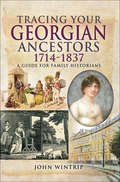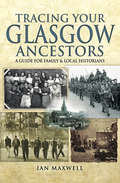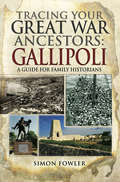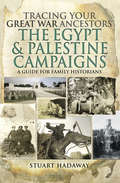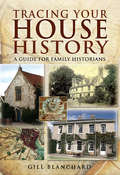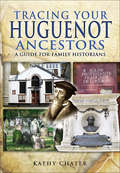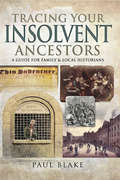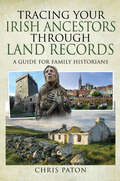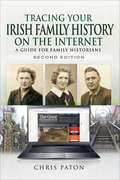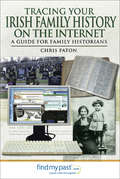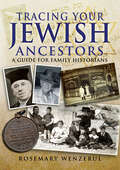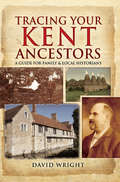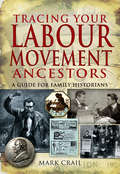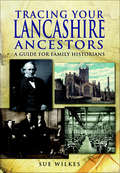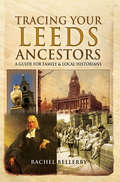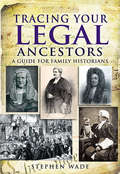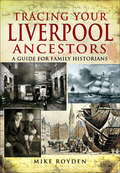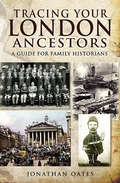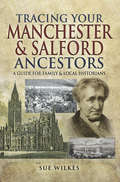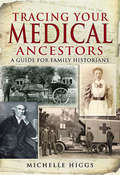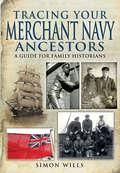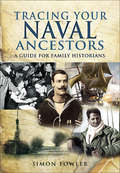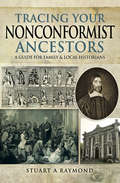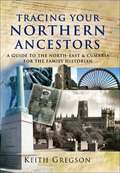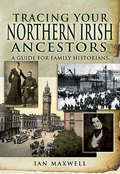- Table View
- List View
Tracing Your Georgian Ancestors, 1714–1837: A Guide for Family Historians (Tracing Your Ancestors)
by John WintripThe Georgian period 1714 to 1837 was a key stage in our modern history so some understanding of it is essential for family historians who want to push their research back into the eighteenth century and beyond, and John Wintrip's handbook is an invaluable introduction to it. In a sequence of concise, insightful chapters he focuses on those aspects of the period that are particularly relevant to genealogical research and he presents a detailed guide to the variety of sources that readers can consult as they pursue their research.While fewer sources are available than for more recent history, obstacles in the way of further research can often be overcome through knowledge of a wide range of sources and a greater understanding the historical context, together with the use of sound research techniques. So the author provides not only a historical overview of relevant topics but he also describes the records of the period in detail.This expert guide to researching the Georgians will open up the field for experienced researchers and for newcomers alike.
Tracing Your Glasgow Ancestors: A Guide for Family & Local Historians (Tracing Your Ancestors)
by Ian MaxwellTracing Your Glasgow Ancestors is a volume in the series of city ancestral guides published by Pen & Sword for readers and researchers who want to find out about life in Glasgow in the past and to know where the key sources for its history can be found. In vivid detail it describes the rise of Glasgow through tobacco, shipping, manufacturing and trade from a minor cathedral town to the cosmopolitan center of the present day. Ian Maxwells book focuses on the lives of the local people both rich and poor and on their experience as Glasgow developed around them. It looks at their living conditions, at health and the ravages of disease, at the influence of religion and migration and education. It is the story of the Irish and Highland migrants, Quakers, Jews, Irish, Italians, and more recently people from the Caribbean, South-Asia and China who have made Glasgow their home. A wealth of information on the city and its people is available, and Glasgow Ancestors is an essential guide for anyone researching its history or the life of an individual ancestor. institutions, clubs, societies and schools.
Tracing Your Great War Ancestors: A Guide for Family Historians (Tracing Your Ancestors)
by Simon FowlerDo you have an ancestor who served in the Gallipoli campaign in the First World War? Perhaps you have thought of visiting the battlefields in Turkey and the monuments that commemorate them, and want to find out exactly where and when your ancestor served and what part he played in the landings and the fighting that followed? This practical and informative handbook is an ideal guide to the struggle for the Gallipoli peninsula and the stories of the men who took part in it. Simon Fowler outlines the course of the campaign and introduces the many historical resources that you can use to explore the history for yourself. He identifies the key sources for family historians, including The National Archives in Britain, the Australian War Memorial, and other sources in Australia and New Zealand and the many websites that researchers can turn to, and he gives advice on the literature, archives, museums and monuments that may help you to gain an insight into your ancestor's story.
Tracing Your Great War Ancestors: A Guide for Family Historians (Tracing Your Ancestors)
by Stuart HadawayTracing Your Great War Ancestors: The Egypt and Palestine Campaigns is the first book explicitly aimed at helping the descendants of those who fought in this part of the Middle East find out more about their ancestors actions, experiences and achievements. Their wartime lives were very different to those who served on the Western Front, and yet have never before been explored from this angle.Hundreds of thousands of British and Imperial troops fought in the Western Desert, Sinai Desert, Palestine, the Jordan Valley and Syria. They served in conditions quite unlike those more familiarly faced in France and Flanders, with everyday challenges to survival including the heat, lack of water, hostile wildlife and rampant disease. The fighting too was of a different character, with more open, sweeping campaigns across desert and mountains, and comparatively little systematic trench warfare.As well as giving the reader a vivid impression of the experience of wartime service in the region, Stuart Hadaways handbook provides a guide to the main sources, archives and websites that researchers can consult to get an insight into their ancestors role and their contribution to the war effort.
Tracing Your House History: A Guide For Family Historians (Tracing Your Ancestors)
by Gill Blanchard“With its practical slant and focus on demystifying unfamiliar property documents, this is the perfect introduction to tracing a house history.” —Family Tree MagazineAnyone who wants to find out about the history of their house—of their home—needs to read this compact, practical handbook. Whether you live in a manor house or on a planned estate, in a laborer’s cottage, a tied house, a Victorian terrace, a twentieth-century council house or a converted warehouse—this is the book for you. In a series of concise, information-filled chapters, Gill Blanchard shows you how to trace the history of your house or flat, how to gain an insight into the lives of the people who lived in it before you, and how to fit it into the wider history of your neighborhood.A wealth of historical evidence is available in libraries, archives and record offices, in books and online, and this is the ideal introduction to it. Gill Blanchard explores these resources in depth, explains their significance and directs the researcher to the most relevant, and revealing, aspects of them. She makes the research process understandable, accessible and fun, and in the process, she demystifies the sometimes-obscure language and layout of the documents that researchers will come up against.“This book is more than a guide to researching the history of your house, or a house of interest. It is a font of interest if you are seeking to research and understand the social and domestic lives of people and their communities from early times.” —Federation of Family History Societies
Tracing Your Huguenot Ancestors: A Guide for Family Historians (Tracing Your Ancestors)
by Kathy ChaterBetween the sixteenth and eighteenth centuries, many thousands of Protestants fled religious persecution in France and the Low Countries. They became one of the most influential immigrant communities in the countries where they settled, and many families in modern-day Britain will find a Huguenot connection in their past. Kathy Chaters authoritative handbook offers an accessible introduction to Huguenot history and to the many sources that researchers can use to uncover the Huguenot ancestry they may not have realized they had. She traces the history of the Huguenots; their experience of persecution, and their flight to Britain, North America, the West Indies and South Africa, concentrating on the Huguenot communities that settled in England, Ireland, Scotland and the Channel Islands. Her work is also an invaluable guide to the various sources researchers can turn to in order to track their Huguenot ancestors, for she describes the wide range of records that is available in local, regional and national archives, as well as through the internet and overseas. Her expert overview is essential reading for anyone studying their Huguenot ancestry or immigrant history in Britain.
Tracing Your Insolvent Ancestors: A Guide for Family Historians (Tracing Your Ancestors)
by Paul BlakeAn easy-to-use guide for British family historians tracing ancestry connected with the insolvency system. Debtors&’ prisons are infamous, but very little has been written about the records of those confined within them in London or elsewhere in the country. Even less has been written about the trials of those who were often incarcerated following misfortune or mismanagement rather than criminal intent. That is why Paul Blake&’s handbook is so useful for researchers who want to learn about forebears who may have been caught up in the insolvency system. In a series of information-filled chapters, Blake covers the historical background to the handling of debt and debtors, and bankruptcy and bankrupts. In addition, he describes the courts and procedures faced by both creditors and debtors, and the prisons where so many debtors were confined. Throughout the book, details are given of the records that researchers can turn to in order to explore the subject for themselves. Many are held at The National Archives, but others are to be found at local record offices around the country. Paul Blake&’s book will be appreciated by local, social and family historians, as well as those with an interest in debtor crime and punishment, and bankrupts in general.
Tracing Your Irish Ancestors Through Land Records: A Guide for Family Historians (Tracing Your Ancestors)
by Chris PatonThe history of Ireland is one that was long dominated by the question of land ownership, with complex and often distressing tales over the centuries of dispossession and colonization, religious tensions, absentee landlordism, subsistence farming, and considerably more to sadden the heart. Yet with the destruction of much of Ireland's historic record during the Irish Civil War, and with the discriminatory Penal Laws in place in earlier times, it is often within land records that we can find evidence of our ancestors' existence, in some cases the only evidence, where the relevant vital records for an area may never have been kept or may not have survived. In Tracing Your Irish Ancestors Through Land Records, genealogist and best-selling author Chris Paton explores how the surviving records can help with our ancestral research, but also tell the stories of the communities from within which our ancestors emerged. He explores the often controversial history of ownership of land across the island, the rights granted to those who held estates and the plights of the dispossessed, and identifies the various surviving records which can help to tease out the stories of many of Ireland's forgotten generations. Along the way Chris Paton identifies the various ways to access the records, whether in Ireland's many archives, local and national, and increasingly through a variety of online platforms.
Tracing Your Irish Family History on the Internet, Second Edition: A Guide for Family Historians (Tracing Your Ancestors)
by Chris PatonA simple, easy-to-use guide to tracing your Irish ancestry via the Internet. In this, the fully updated second edition of his best-selling guide to researching Irish history using the Internet, Chris Paton shows the extraordinary variety of sources that can now be accessed online. Although Ireland has lost many records that would have been of great interest to family historians, he demonstrates that a great deal of information survived and is now easily available to the researcher. Thanks to the pioneering efforts of the Public Record Office of Northern Ireland, the National Archives of Ireland, organizations such as FindmyPast Ireland, Ancestry.co.uk, and RootsIreland and the volunteer genealogical community, an ever-increasing range of Ireland&’s historical resources are accessible from afar. As well as exploring the various categories of records that the family historian can turn to, Chris Paton illustrates their use with fascinating case studies. He fully explores the online records available from both the north and the south from the earliest times to the present day. Many overseas collections are also included, and he looks at social networking in an Irish context where many exciting projects are currently underway. Paton&’s book is an essential introduction and reference for anyone who is keen to trace their Irish roots.
Tracing Your Irish Family History on the Internet: A Guide for Family Historians (Tracing Your Ancestors)
by Chris Paton&“A thorough and informative guide . . . with as many references to websites for Northern Irish genealogy as for the Republic of Ireland.&” —Who Do You Think You Are Magazine Ireland has experienced considerably more tragedy when it comes to the preservation of resources for family historians than its close neighbor Britain. Many of the nation&’s primary records were lost during the civil war in 1922 and through other equally tragic means. But in this new book Chris Paton, the Northern-Irish-born author of the bestselling Tracing Your Family History on the Internet, shows that not only has a great deal of information survived, it is also increasingly being made available online. Thanks to the pioneering efforts of the Public Record Office of Northern Ireland, the National Archives of Ireland, organizations such as FindmyPast Ireland, Ancestry.co.uk and RootsIreland, and the massive volunteer genealogical community, more and more of Ireland&’s historical resources are accessible from afar. As well as exploring the various categories of records that the family historian can turn to, Chris Paton illustrates their use with fascinating case studies. He fully explores the online records available from both the north and the south from the earliest times to the present day. Many overseas collections are also included, and he looks at social networking in an Irish context where many exciting projects are currently underway. His book is an essential introduction and source of reference for anyone who is keen to trace their Irish roots.&“Chris Paton has produced this much-needed book for researchers tracing Irish roots, pulling together all the current online resources and expert advice into one handy guide.&” —Family Tree Magazine
Tracing Your Jewish Ancestors: A Guide For Family Historians (Tracing Your Ancestors Ser.)
by Rosemary WenzerulRosemary Wenzerul's lively and informative guide to researching Jewish history will be absorbing reading for anyone who wants to find out about the life of a Jewish ancestor. In a clear and accessible way she takes readers through the entire process of research. She provides a brief social history of the Jewish presence in Britain, with descriptions of the principal communities all over the country. She gives a concise account of the history of genealogy and looks at practical issues of research – how to get started, how to organize the work, how to construct a family tree and how to use the information obtained to enlarge upon the social history of the family. She describes, in practical detail, the many sources that researchers can go to for information on their ancestors, their families and Jewish history. Vivid case studies are a feature of her book, for they show how the life stories of individuals can be reconstructed with only a small amount of initial information. Her invaluable handbook will be essential reading and reference for anyone who is trying to gain an insight into the life of an ancestor or is researching any aspect of Jewish history.
Tracing Your Kent Ancestors: A Guide for Family & Local Historians (Tracing Your Ancestors)
by David WrightGenealogically and historically, Kent is an important maritime county which has played a prime defensive role in English history. It is large and diverse and replete with great houses, castles and other family homes, many with their own archives. It is also a fascinating area of research for family and local historians, and David Wrights handbook is the perfect guide to it. For thirty-five years he has been working with the various Kent archives, and his extensive experience means he is uniquely well placed to introduce them to other researchers and show how they can be used. He summarizes the many different classes of Kent records, both national and local. For the first time he draws together the best of modern indexing and cataloguing along with other long-established sources to produce a balanced and up-to-date overview of Kentish genealogical sources where to find them, their contents and utility to researchers. Tracing Your Kent Ancestors is essential reading and reference for newcomers to family history, and it will be a mine of practical information for researchers who have already started to work in the field.
Tracing Your Labour Movement Ancestors: A Guide for Family Historians (Tracing Your Ancestors)
by Mark CrailIf you want to find out about the life of an ancestor who was active in the labor movement or was a union member, this handbook will be a fascinating introduction to the subject. Mark Crail provides a graphic and authoritative account of the history of the labor movement in Britain from the early nineteenth century to the modern day. He gives a vivid insight into the key stages in the development of labor relations - the battles fought by labor movement pioneers, the formation of the first unions, the influence of Chartism and the early socialist societies, the rise of the Labor Party and other left-wing groups, and the impact of organized labor on workers lives as ordinary people gradually won the right to vote over the course of 200 years. At the same time he describes in detail the various books, museums, archives, websites and other resources that researchers can use to explore labor history for themselves and to uncover the careers and experience of their ancestors. A mass of information is available relating to individuals and to labor history in general, and this handbook is an invaluable guide to it. 'Tracing Your Labor Movement Ancestors' should be essential reading for anyone who wishes to learn about the origins and development of the labor movement and the role of individuals within it.
Tracing Your Lancashire Ancestors: A Guide for Family Historians (Tracing Your Ancestors)
by Sue WilkesIf you want to find out about Lancashires history, and particularly if you have family links to the area and your ancestors lived or worked in the county, then this is the ideal book for you. As well as helping you to trace when and where your ancestors were born, married and died, it gives you an insight into the world they knew and a chance to explore their lives at work and at home.Sue Wilkess accessible and informative handbook outlines Lancashires history and describes the origins of its major industries - cotton, coal, transport, engineering, shipbuilding and others. She looks at the stories of important Lancashire families such as the Stanleys, Peels and Egertons, and famous entrepreneurs such as Richard Arkwright, in order to illustrate aspects of Lancashire life and to show how the many sources available for family and local history research can be used. Relevant documents, specialist archives and libraries, background reading and other sources are recommended throughout this practical book. Also included is a directory of Lancashire archives, libraries and academic repositories, as well as databases of family history societies, useful genealogy websites, and places to visit which bring Lancashires past to life. Sue Wilkess book is the essential companion for anyone who wants to discover their Lancashire roots.
Tracing Your Leeds Ancestors: A Guide for Family & Local Historians (Tracing Your Ancestors)
by Rachel BellerbyExplore the lives of your ancestors in the 'city of 1,000 trades' in this family and local history guide, dedicated to the city of Leeds. Learn how to find out more about the streets where your ancestors lived, where they would have gone to school and church and chapel, how they'd have spent their leisure time, what life would have been like for immigrants in the city, and discover more about the different trades in which your family members were involved.Leeds is home to many different archives and collections, from records of major companies such as Joshua Tetley & Sons, Burtons Tailors and Marks & Spencers, to street plans, photo collections and records of theatres and football clubs. Rachel Bellerby's handbook shows you how to get started with your research, building up an intriguing and colourful record of the city that your ancestors called home. It is an essential guide for anyone living in Leeds or with family connections to the city.
Tracing Your Legal Ancestors: A Guide for Family Historians (Tracing Your Ancestors)
by Stephen WadeThe law had as much influence on our ancestors as it does on us today, and it occupies an extraordinary range of individuals, from eminent judges and barristers to clerks and minor officials. Yet, despite burgeoning interest in all aspects of history and ancestry, lawyers and legal history have rarely been looked at from the point of view of a family historian. And this is main purpose of Stephen Wades accessible and authoritative introduction to the subject. Assuming that the reader has little prior knowledge of how or where to look for such information, he traces the evolution of the law and the legal professions. He describes the parts played in the system by solicitors, officers of the High Court, registrars, recorders, town clerks, clerks of the peace, proctors, coroners, notaries, parliamentary agents, judges, barristers and magistrates. Also he identifies the various archives, records and books that the family researcher can turn to, and discusses other sources including the internet. Stephen Wades concise account of legal history and research resources will be an invaluable guide for anyone who is studying the subject or seeking an ancestor who was associated with it.
Tracing Your Liverpool Ancestors: A Guide for Family Historians (Tracing Your Ancestors)
by Mike RoydenTracing Your Liverpool Ancestors' gives a fascinating insight into everyday life in the Liverpool area over the past four centuries. Aimed primarily at the family and social historian, Mike Royden's highly readable guide introduces readers to the wealth of material available on the citys history and its people. In a series of short, information-packed chapters he describes, in vivid detail, the rise of Liverpool through shipping, manufacturing and trade from the original fishing village to the cosmopolitan metropolis of the present day. Throughout he concentrates on the lives of the local people on their experience as Liverpool developed around them. He looks at their living conditions, at poverty and the laboring poor, at health and the ravages of disease, at the influence of religion and migration, at education and the traumatic experience of war. He shows how the lives of Liverpudlians changed over the centuries and how this is reflected in the records that have survived. His useful book is a valuable tool for anyone researching the history of the city or the life of an individual ancestor.
Tracing Your London Ancestors: A Guide for Family Historians (Tracing Your Ancestors)
by Jonathan OatesLondon is a key site for family historians. Many researchers, seeking to trace their ancestry back through the generations, will find their trail leads to London or through it. Yet, despite the burgeoning interest in genealogy and the importance of London in so many life stories, few previous books have explored the citys history or provided guidance on the research resources family historians can use to discover the life of a London ancestor. This is the purpose of Jonathan Oatess invaluable handbook. In a series of short, information-packed chapters he describes the principal record offices, archives, libraries and other sources researchers can go to, and shows how Londoners can be tracked through censuses, registers and directories over the last 500 years. Then he explores key aspects of Londons history from a family historians point of view. Crime, religion and education - and the body of evidence associated with them - are covered, as is the historical trail left by taxation, health, welfare, work and business. He looks also at the military and wartime records available in the city, and at the records of immigrant communities who have had such a notable impact on the development of the capital. Each section introduces the reader to the relevant sources, indicates where they can be found, and offers essential advice on how this information can be used to piece together the lives of distant and not-so-distant relatives.
Tracing Your Manchester & Salford Ancestors: A Guide For Family & Local Historians (Tracing Your Ancestors)
by Sue WilkesFor readers with family ties to Manchester and Salford, and researchers delving into the rich history of these cities, this informative, accessible guide will be essential reading and a fascinating source of reference.Sue Wilkes outlines the social and family history of the region in a series of concise chapters. She discusses the origins of its religious and civic institutions, transport systems and major industries. Important local firms and families are used to illustrate aspects of local heritage, and each section directs the reader towards appropriate resources for their research.No previous knowledge of genealogy is assumed and in-depth reading on particular topics is recommended. The focus is on records relating to Manchester and Salford, including current districts and townships, and sources for religious and ethnic minorities are covered. A directory of the relevant archives, libraries, academic repositories, databases, societies, websites and places to visit, is a key feature of this practical book.
Tracing Your Medical Ancestors: A Guide for Family Historians (Tracing Your Ancestors)
by Michelle HiggsThe medical profession had as much influence on the lives of our ancestors as it does on our lives today. It occupied an extraordinary range of individuals - surgeons, doctors, nurses and specialists of all kinds. Yet, despite burgeoning interest in all aspects of history and ancestry, medicine has rarely been considered from the point of view of a family historian. This is the main purpose of Michelle Higgss accessible and authoritative introduction to the subject. Assuming the reader has little prior knowledge of how or where to look for such information, she traces the development of medical practice and patient care. She describes how attitudes to illnesses and disease have changed over time. In particular, she looks at the parts played in the system by doctors and nurses - at their role, training and places of work and she also looks at the patients and their experience of medicine in their day.'Each section identifies the archives and records that the family historian can turn to, and discusses other potential sources including the Internet. The book is an invaluable guide to all the information that can give an insight into the experience of an ancestor who worked in medicine or had a medical history.
Tracing Your Merchant Navy Ancestors: A Guide for Family Historians (Tracing Your Ancestors)
by Simon WillsWhat was a merchant seamans life like in the past, what experiences would he have had, what were the ships like that he sailed in, and what risks did he run? Was he shipwrecked, rewarded for bravery, or punished? And how can you find out about an ancestor who was a member of the long British maritime tradition? Simon Wills concise and informative historical guide takes the reader and researcher through the fascinating story of Britains merchant service, and he shows you how to trace individual men and women and gain an insight into their lives. In a series of short, information-packed chapters, he explains the expansion of Britains global maritime trade and the fleets of merchant ships that sustained it in peace and war. He describes the lives, duties and tribulations of the generations of crews who sailed in these ships, whether as ordinary seamen or as officers, stewards, engineers and a myriad of other roles. In addition, he identifies the websites you can explore, the archives, records and books you can read, and the places you can visit in order to gain an understanding of what your seagoing ancestor did and the world he knew. Simon Wills practical handbook will be essential reading and reference for anyone who is keen to discover for themselves the secrets of our maritime past and of the crewmembers and ships that were part of it.
Tracing Your Naval Ancestors: A Guide for Family Historians (Tracing Your Ancestors)
by Simon FowlerThis concise guide to naval history and naval records is essential reading and reference for anyone researching the fascinating story of Britains navy and the men and women who served in it. Whether you are interested in the career of an individual seaman, finding out about a medal winner or just want to know more about a particular ship, campaign or operation, this book will point you in the right direction. Simon Fowler assumes the reader has little prior knowledge of the navy and its history. His book shows you how to trace an officer, petty officer or rating from the seventeenth century up to the 1960s using records at the National Archives and elsewhere. The book also covers the specialist and auxiliary services associated with the navy among them the Royal Marines, the Fleet Air Arm, the naval dockyards, the WRNS and the Fleet Auxiliary. In each section he explains which records survive, where they can be found and how they can be used for research. He also recommends resources available online as well as books and memoirs. His handbook is a valuable research tool for anyone who is keen to find out about the career of an ancestor who served in the Royal Navy or was connected with it.
Tracing Your Nonconformist Ancestors: A Guide for Family & Local Historians (Tracing Your Ancestors)
by Stuart A. RaymondWe all have Nonconformist ancestors. In the mid-nineteenth century almost half of the English population were Nonconformists. And there were very few villages where there was not at least one Nonconformist chapel. Local and family historians need to be aware of the diversity of Nonconformity, and of the many sources which will enable them to trace the activities of Nonconformist forebears.Stuart Raymond's handbook provides an overview of those sources. He identifies the numerous websites, libraries and archives that local and family historians need to consult. These are described in detail, their strengths and weaknesses are pointed out, and the contribution currently made by the internet is highlighted.Most Nonconformist denominations are discussed not just the mainstream Presbyterians, Congregationalists, Quakers and Methodists, but also obscure sects such as the Muggletonians and Glasites, and even the two groups who regularly appear on our doorsteps today Jehovahs Witnesses and the Mormons.The religious activities of our Nonconformist ancestors tell us a great deal about them, and provide fascinating insights into their lives.
Tracing Your Northern Ancestors: A Guide to the North East & Cumbria for the Family Historian (Tracing Your Ancestors)
by Keith GregsonThe far north of England is a key site for family historians. Many researchers, seeking to trace their ancestry back through the generations, will find their trail leads to the north or through it. And yet, despite the burgeoning interest in genealogy and the importance of the region in so many life stories, no previous book has provided a guide to the documents and records that family historians can use in their search. In this accessible and informative introduction to the subject, Keith Gregson looks at the history and heritage of the region - of Northumberland, Tyneside, Durham, Wearside, Tees Valley and Cumbria - and gives a fascinating insight into the world in which our ancestors lived. He introduces the reader to the variety of records that are available for genealogical research, from legal and ecclesiastical archives, birth and death certificates to the records of local government, employers, institutions, clubs, societies and schools.
Tracing Your Northern Irish Ancestors: A Guide for Family Historians (Tracing Your Ancestors)
by Ian MaxwellTracing Your Northern Irish Ancestors is an expert introduction for the family historian to the wealth of material available to researchers in archives throughout Northern Ireland. Many records, like the early twentieth-century census returns and school registers, will be familiar to researchers, but others are often overlooked by all but the most experienced of genealogists. An easy-to-use, informative guide to the comprehensive collections available at the Public Record Office of Northern Ireland is a key feature of Ian Maxwells handbook. He also takes the reader through the records held in many libraries, museums and heritage centers across the province, and he provides detailed coverage of records that are available online. Unlike the rest of the British Isles, which has very extensive civil and census records, Irish ancestral research is hampered by the destruction of many of the major collections. Yet Ian Maxwell shows how family historians can make good use of church records, school registers and land and valuation records to trace their roots to the beginning of the nineteenth century and beyond.
